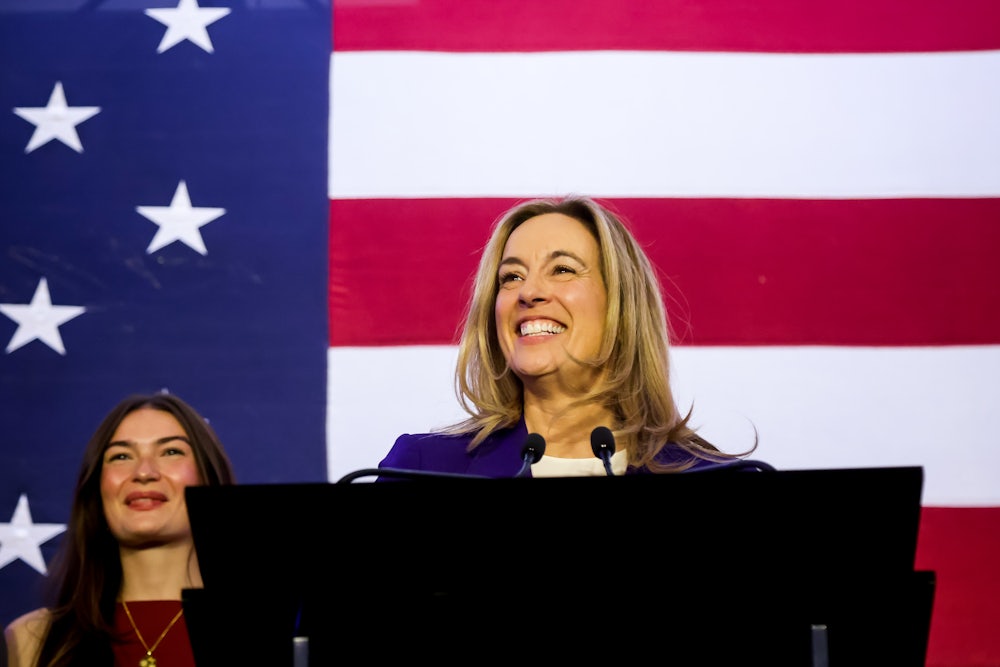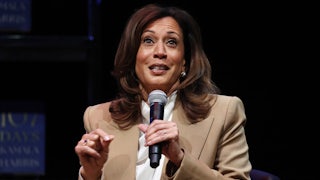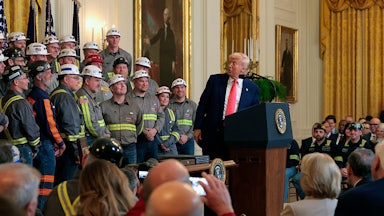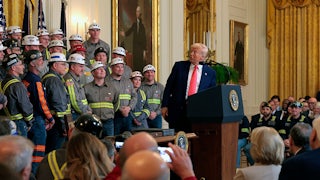Donald Trump campaigned on a promise to make life more affordable for ordinary Americans. Instead, his policies have made life more expensive, while his war on climate policy has ended programs that put money in voters’ pockets. Under his regime, our whole society seems increasingly threatened by an arrogant and misanthropic tech ruling class that expects the American masses to endure eye-popping costs—or boil in summer and freeze in winter—so that they can build planet-destroying data centers for artificial intelligence that risks harming our mental health, degrading our culture, and leading to mass layoffs.
It doesn’t have to be this way, and it turns out that when Democrats say so, they can win. On Tuesday, Democratic candidates who presented a vision of climate policy promising to make energy more affordable to ordinary Americans did spectacularly well. Assessing the Democrats’ victory this week, some key Republicans told Politico that the Democrats had dominated them on the energy affordability issue—an issue for which they have no solutions. Strangely enough, blocking offshore wind and spreading misinformation about green energy isn’t helping a single voter pay her utility bill.
Not only are the impacts of climate change ever more obvious over the past year—last week alone two people died in floods in New York City, while a new report estimates extreme heat kills one person per minute worldwide—but increasingly, Americans are struggling to pay our energy bills. Nearly one-quarter of adults in the U.S. cannot pay their power bills, according to 2024 census data. As noted in an October study by Public Grids, an organization that advocates for public power, that was before massive data center growth and the Republican-led evisceration of the Inflation Reduction Act, which had some provisions for making renewable energy more affordable for homeowners and renters.
In New Jersey, one of the most important gubernatorial races in the country, the victorious Democrat, Mikie Sherrill, touted offshore wind while campaigning against Jack Ciattarelli, a Trump-endorsed enemy of all turbine construction. She put energy affordability at the heart of her campaign, vowing to freeze utility rates, “massively build out cheaper and cleaner” power generation, regulate energy companies far more tightly, and sue the Trump administration to allow New Jersey to expand its renewables sector. It wasn’t just part of her platform; she talked about it all the time, spending a quarter of her ad money on the issue. With New Jersey residents facing a 22 percent increase in their electricity costs, energy affordability was central to the election, and Sherrill’s approach prevailed. It also helped that the New Jersey League of Conservation Voters spent $1.7 million attacking her opponent on this issue.
Similarly, Abigail Spanberger, the Democratic gubernatorial winner in Virginia—who, like Sherrill, is generally regarded as a centrist Democrat—ran ads in which she talked about energy affordability; promised to make data centers pay their fair share of energy costs; and said she’d build out solar, wind, and nuclear power. In Georgia, in a relatively obscure race for seats on the state’s Public Service Commission, two Democrats prevailed over Republicans by touting renewable energy and curbs on data center development, the first Democratic victory in Georgia in a nonfederal statewide election in almost 20 years. In another lower-profile but important win, in Pennsylvania, three Democratic state Supreme Court justices kept their seats, preserving a Democratic majority on the court as it considers an important climate case, on the legality of Democratic Governor Josh Shapiro’s carbon credit program.
In New York City, socialist mayoral candidate Zohran Mamdani ran a campaign relentlessly focused on affordability. While he didn’t talk that much about energy or climate in this election—probably because so many of the relevant solutions lie in the hands of the state more than the city government—that issue has played a huge role in his political career as a state legislator. As a member of the New York state Assembly, Mamdani was a critical voice supporting the Build Public Renewables Act in 2023, a victory that greatly expanded and popularized the New York City Democratic Socialists, or NYC-DSA—and Mamdani himself—as climate leaders. Mamdani also championed and passed a successful free buses pilot when in the Assembly, and citywide “fast and free” buses became central to his winning platform as a mayoral candidate, even though it wasn’t often framed as a climate issue during the campaign.
The energy affordability topic—and Tuesday’s election results—upend some of the blather we hear about how voters don’t care about climate. The Environmental Voter Project organized volunteers to turn out climate voters for Tuesday in New York, Virginia, Pennsylvania, and Georgia, making 125,000 calls to Georgia in the last four days of the election alone. According to data cited in its press release, voters for whom climate was a salient issue ended up being far more likely to vote than other registered voters in each of the elections I’ve discussed here: twice as likely in New Jersey and almost three times as likely in Georgia.
Energy affordability is going to be an even bigger deal in the midterms, given that our tech overlords keep recklessly building AI and the issue is a national one. If Democrats continue to push constructive climate-friendly ways to help regular people balance their household budgets and curb the power of utility, fossil fuel, and tech companies, they’re likely to keep winning. Never underestimate the capacity of national Democratic leadership to screw this up by caving to corporate interests and hampering the ability of the party to distinguish itself from Republicans. But what we saw this week is an encouraging opening salvo.








